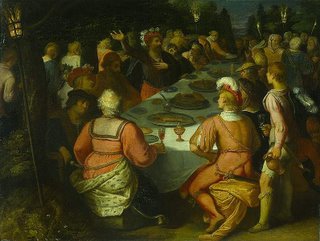The goodness of Benedict

Early tonight, a good woman was at my door to see whether I would make my contribution to the church of which I am a member. I said I would. Although I am not particularly religious, I do wish to express my appreciation for the work of the church in our community and - in a way – to make clear where I stand in the world of our Christian humanity.
I am a staunch protestant. Yet I follow the events in Rome with keen interest. Whatever one may say of Rome’s rigidity v.à.v. Christians who call themselves Catholics, the Vatican is the only authoritative source available on the broader meaning of Christianity in our current world. So, whereas many of the stringent rulings of the Church affect its members only, a Pope’s actual influence extends far beyond its constitutional borders and thus affects the identity of other Christians much at the same time.
And it so happened today that Benedict XVI issued his first reading as the supreme teacher of the Catholic Church.
The new encyclical is titled ‘Deus Caritas Est’. Most papers translate this as: ‘God is Love’. But when one reads its content, it might be better to translate it as: 'God is Goodness'.
"In a world where the name of God is sometimes associated with vengeance or even a duty of hatred and violence, this message is both timely and significant," Benedict writes. "For this reason, I wish in my first encyclical to speak of the love which God lavishes on us and which we in turn must share with others." Well, fair enough.
He then proceeds to explain his concept of love. Benedict projects this concept first of all as an expression of the bond between a man and a woman. He underscores that this concept of love should “mature into unselfish concern for the other - creating a love that ultimately demands charity and justice even to strangers.” Wonderful.
Love is “a journey, an ongoing exodus out of the closed inward-looking self toward its liberation through self-giving, and thus toward authentic self-discovery and indeed the discovery of God." It takes a Pope to make love sound so beautiful.
“Deus Caritas Est” further elaborates the concept of love along those lines. Really, it doesn’t strike any discord with me.
And the first responses to this recent teaching seem equally positive. A liberal group We Are Church, called the encyclical "a sign of hope" that Benedict would prove to be a "human face for Christianity and for the Catholic church."
Most of all, this papal letter to the bishops seems much more an exploration than an instruction. In no way does it order or condemn. It confirms the profound humanity that seems to drive this Pope, who is a man of age and who – as I see it - more than anyone else realizes that this is not the time for yet another Crusade, but for reconciliation and for coming to terms with the commonalities of humanity, rather than to seek the light between them.
Thus far, I have viewed Benedicts papacy as an extension of the reign of John Paul II, and in many ways his new encyclical seems to confirm this. At various points he stresses the continuity of the papacy in the past nearly thirty years. I believe it is part of his strength – and of his potential to effectively address the many conflicts that still linger between the – western – Christian world and others.
In fact I believe the moment is long overdue that our Christian societies, whether Catholic, Protestant or otherwise, come clean on what the Benedict’s goodness of God really offers to the rest of the world.










